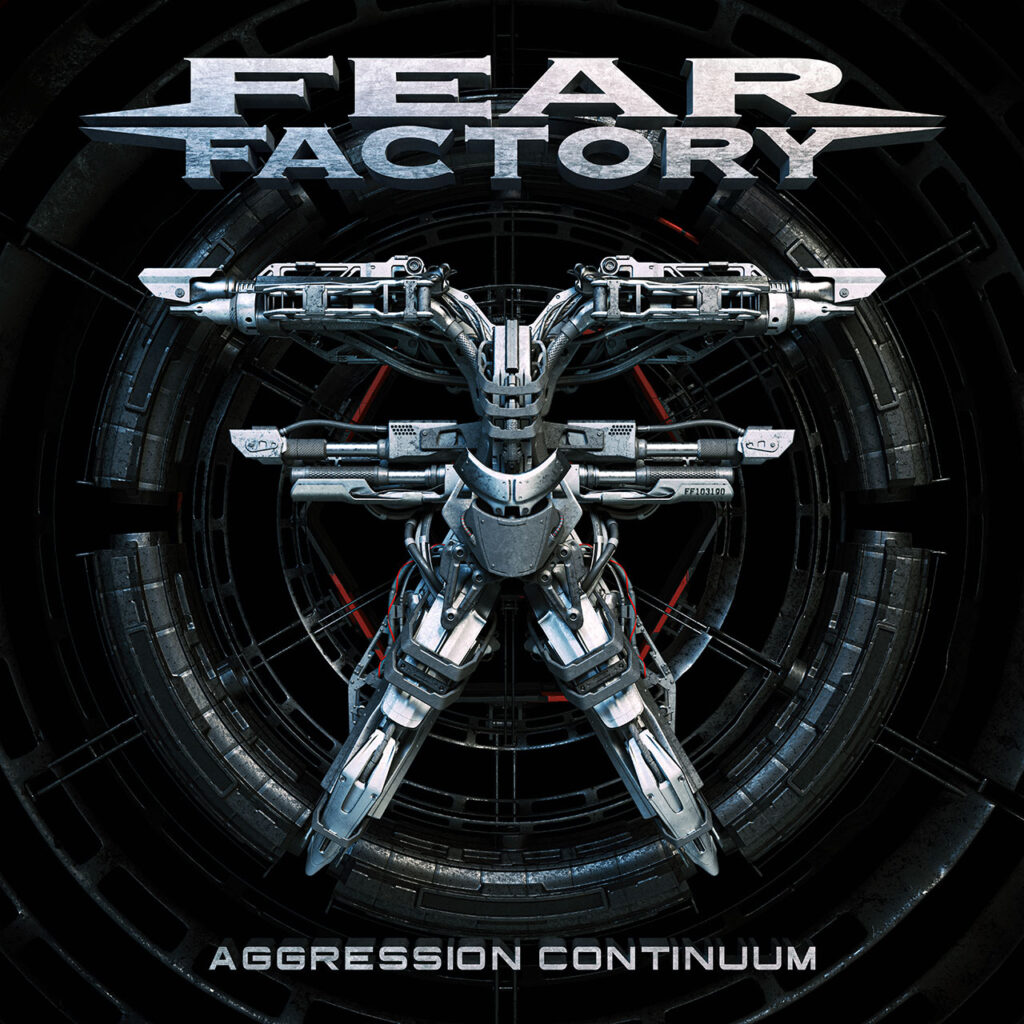
And so, after all the delays and drama, the final Fear Factory album (or at least the final one to feature the talents of departed vocalist Burton C. Bell) is upon us. It’s been a long time coming – six years since 2015’s well-received Genexus – but with the material itself recorded before the legal wrangles and social media statements took their toll on the band, there’s no sense of impending collapse evident in the music. Indeed, the only slight sign that all is not as it should be is the fact that Burton did not take the trouble, as he did with Obsolete, to flesh out an obviously detailed concept in the liner notes. Nevertheless, mixed by Andy Sneap, the ten tracks on offer here are prime Fear Factory, delivered with frequently devastating precision, and whatever happens with the band in the future, this is most assuredly one hell of a swan song for Burton.
Aggression Continuum begins, much as we have come to expect with Fear Factory, with a prelude that provides insight into the plot before Dino’s instantly recognizable riff hurls us into Recode. Andy Sneap’s crystalline mix allows every element to shine, while churning, industrial percussion drives everything forward remorselessly. With melodies that echo the immortal Obsolete, Recode sets a high bar for the album that follows, although the fade-out at the end feels a little hurried, where it would have been better if it had segued more effectively into a blistering Disruptor. With Burton delivering a vocal that slips neatly between John Tardy’s gutteral delivery and Gary Numan’s dark melodies, Disruptor is Fear Factory doing what they do best, treading a line between the melodic and the mechanistic, and yet even this most savage of tracks is eclipsed by the searing title track. With Dino digging deep, the riffs that birth the song into the world are utterly devastating, while Burton matches him in steely-eyed ferocity every step of the way. After the coruscating Aggression Continuum, Purity pairs typically brutal riffing with a wider electronic palette, allowing for a stronger focus on melody. Reminiscent in part of the more streamlined approach taken on Digimortal, Purity would make a good choice for a single, thanks in no small part to an emotionally-charged chorus that sticks in the mind. The first half of the album comes to an end with the Mad Max-styled Fuel Injected Suicide Machine, a gas-guzzling juggernaut bristling with icy electronics and hulking melodies.
Fading in on the sounds of a government-mandated lockdown, Collapse is built around an elastic riff that sees Fear factory edge into Meshuggah territory, and it proves to be one of the album’s heaviest cuts, harking all the way back to fan favourite Demanufacture with its palpable sense of rage and disillusionment. It’s followed by the stuttering Manufactured Hope, which pairs dizzying riffs and analogue synths to impressive effect. This, in turn, paves the way for the EBM-influenced Cognitive Dissonance, a track that begins on the dance floor and ends in some mechanistic hell, where battered T800s claw at the listener as they’re crushed into oblivion. Another track that manages to tread that fine line between as heavy as a heavy thing and as catchy as hell, Monolith comfortably sits among the very best of Fear Factory to date. Bringing the album to a close, the prophetically-titled End Of Line is a satisfyingly chunky number that pairs Dino’s trademark stuttering riffs with skittering electronica, while a phenomenal vocal from Burton, even managing to reference the band’s beloved Frank Herbert one last time, gives the track a sense of finality. A powerful and deeply satisfying conclusion to an impressive album, End Of Line is a fitting last stand, even if it was never intended as such, with Burton’s plaintive cry of “this can’t be real” echoing the emotions of Fear Factory fans shocked at his departure.
When an album emerges amidst inter-band turmoil, it is tempting to look for clues in the music but, in truth, Aggression Continuum is very much business as usual for Fear Factory. Burton’s powerful vocals remain a focal point and, if the narrative thrust of the album is not as clear as on Obsolete, Dino’s ability to juxtapose chrome-plated riffing and cinematic soundscapes successfully paper over any potential cracks. It’s hard to imagine the band without Burton’s distinctive bark in the future, but if this truly is to be his last stand with the band, he has undoubtedly left on a an impressive high. 8.5/10



